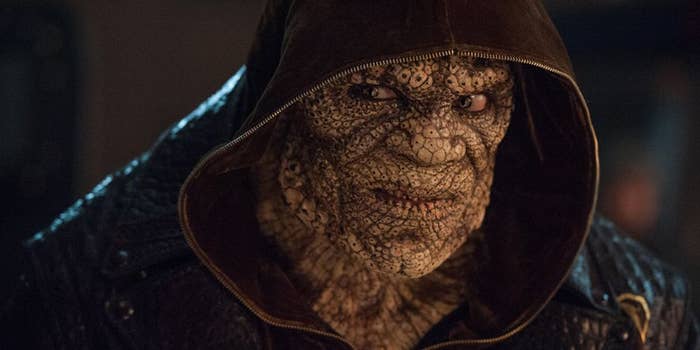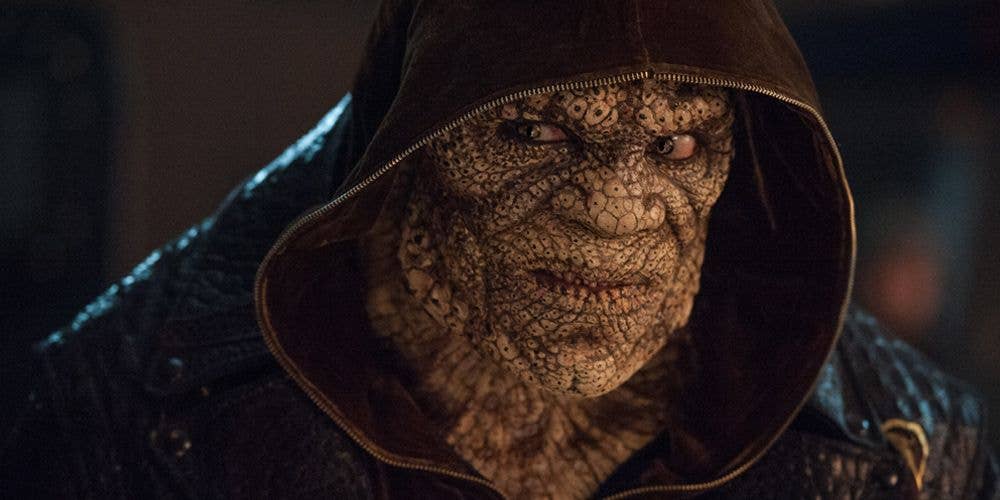
Without a doubt, Adewale Akinnuoye-Agbaje, has helped craft a number of memorable characters. The London-based, 48-year-old actor may have started his career off as a model, but he's moved from one strong role to another over the last two decades. It's easy to tell how old someone is based on what role they associate him with. I first saw him and his tilted knit cap as Adebisi in Oz; others might know of him as the gruff Lock-Nah in The Mummy Returns. My son, though, will no doubt latch onto his monstrous take as the Killer Croc in DC's upcoming film Suicide Squad, a role that had him trekking through the darker sides of the human psyche.
The DC Comics villain known as Killer Croc was born Waylon Jones, a boy with a rare genetic condition that gives him a crocodilian appearance. After sustaining abuse from his aunt for years, he ended up killing her and devoting his life to crime. Similar to his Suicide Squad members Harley Quinn and Deadshot, he's been a thorn in Batman's side, but judging by his inclusion in the team, it looks like Croc might be trying to put his time spent as a murderous criminal to some good use.
We recently caught up with Adewale, who took us inside the transformation into the Killer Croc, a tale that involves a croc crib, the confessions of an IRL cannibal, and David Ayer's unique tutelage.
What attracted you to Suicide Squad and this role?
First of all, I was excited to work with David Ayer, I'd seen his work, particularly Fury, and I was particularly impressed with what he was able to do with such a large cast, and at the same time giving everybody their moment in the sun.
And was there anything specific about Killer Croc that hooked you?
I looked into the back story of Killer Croc, and Waylon Jones, and found it to be intriguing. To find that he was a person, a young boy, and a man inflicted with this disease. I thought that journey, as it was depicted in the comic books, was quite interesting. I also thought that because it was the first rendition that we were going to see on film, that gave me some creative license to do something different with it, to pay homage to the comic book history.
It seems like you guys are a really close knit bunch. Why specifically did this group of people turn into a little community?
I think it's David Ayer. He has a particular working process—we did a six-week boot camp, which was very physically and emotionally intense. We were rehearsing every night. That in itself made us bond as a group before we even got to the set. By the time we got to the set, we were very much a squad. Also, it always helps when you've got somebody like Will Smith, who is intent on making the whole process fun.
I've read that you had to go through something like five hours of makeup a day to get the full prosthetics of Killer Croc. Would you consider this being the most challenging role in your career?
Yeah, certainly physically. It's definitely the most challenging because before I even got to set, I'd have to apply three-to-five hours of makeup and then I'd have to be in it for 12 hours, and then it'd take two hours to take it off. You do that for five months, you figure out very quickly what you're made of. Definitely, by far, my most challenging physical part. I had to perform in it, I had to fight in it, I had to learn how to live in it. At times, it was difficult to breathe—you sweat profusely and even how you eat was challenging. It is a test of endurance. The training process that David Ayer put us through prepared me to a large degree for it, but ultimately you do have to be a person of a strong character and mind to be able to go through that.
That's interesting that you mention that, because in the lead-up to the film, you hear about the steps that Jared Leto took to get into the mindstate of being The Joker. Would you say that these different changes you had to go through had any mental effect? Did you do any method acting to tap into Killer Croc?
I'm very much the type of actor that once I embody the character, I could stay in it from the beginning to the end. Not only did Killer Croc have a different accent, he had an American accent, but there was also a note from the director that he was a real cannibal. So I did a lot of research on that: I found the confessions of a real-life cannibal by the name of Issei Sagawa, a Japanese cannibal. I would play [a recording of Sagawa's confessions] at least 15 times a day. Anytime I was going to set, I would play that and it would put me in this very dark mindset to the horror of my prosthetics team who also had to endure listening to that for five hours.
I also had production build me a croc crib, which was slightly off from the main squad, precisely because I wanted the squad to feel uneasy and never quite be able to read Killer Croc. And, again, that was a direction given to me by David Ayer, that they should never feel comfortable in your presence. Even though you are in the squad, you are still a predator.
People were disappointed when the film's rating came out as PG-13 as opposed to R. What do you say to anybody who might have any preconceived notions about the film based on the rating?
One of the things you're going to be surprised about is that my character has a sense of humor. David Ayer is known for being a very serious filmmaker, but he has a very great sense of humor. There's a very organic sense of humor and banter between this dysfunctional squad of villains. What I would say is, you know, it is very much a movie for all. Anybody that has a sense of humor will be able to get with this movie. After all, they're supervillains, they're not real people.

